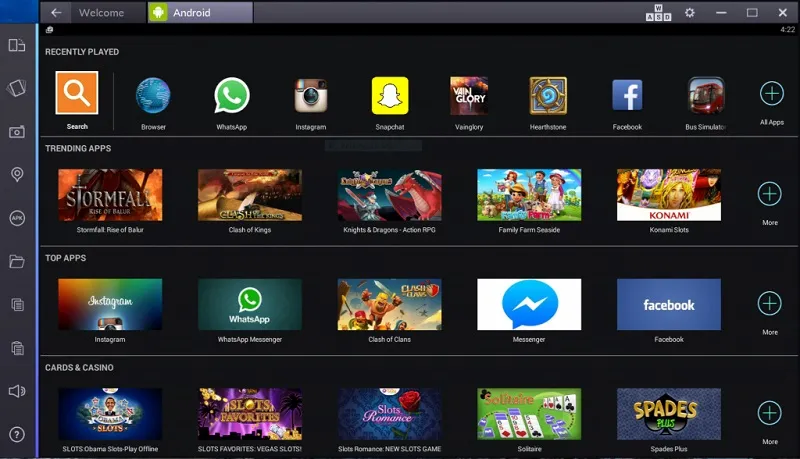With 130M users in 196 countries, Andreessen Horowitz-backed Bluestacks looks to bridge the gap between PCs and smartphones
While smartphones have revolutionised multiple industries in the past few years, some analysts believe that we are now entering the second smartphone revolution, which will have a greater impact. About two billion smartphones are sold every year and it is estimated that by 2020 there will be at least five billion people using phones worldwide. Reports from IDC and Gartner suggest that personal computer shipments declined for the sixth consecutive quarter (Q1 2016), while gaming PCs shipments saw a rise.
Even as the world is increasingly going mobile and relying more on the app ecosystem a vast majority of global smartphones have limited capabilities and can’t leverage the full power of the app ecosystem, which is estimated to have over 1.2 million apps. Bluestacks, a Silicon Valley-based cross-platform tech company is bridging the gap between smartphones and PCs to bring the best of both worlds to users.

Story so far
Bluestacks was founded in 2011 by Rosen Sharma, Jay Vaishnav and Suman Saraf. As an Android emulator for PCs, BlueStacks started out as a cross-platform app player. The company officially launched the alpha version of their product in October 2011, as a downloadable software that provided a ‘virtual Android experience’ on Windows laptops and Macbooks.
In 2013, Bluestacks has a user install base of 10 million and also launched ‘Gamepop’, its own video game micro-console and subscription service based on Android. By offering access to an estimated 1.5 million Android games and apps, five lakh HTML5/Flash games, Bluestacks has been able to grow to a user base of 130 million globally. The company has also raised about $30 million in funding from firms such as Andreessen-Horowitz, Samsung, Intel, Qualcomm Ventures and others.

Most recently, after crossing a landmark of one billion apps used per month, the company released ‘Bluestacks 2.0’ that added new features such as better app discovery and ability to run multiple apps in different tabs at the same time.
Bluestacks currently consists of a team of 100 employees. Talking to YourStory, John Gargiulo, SVP, Business Development and Marketing at Bluestacks, elaborated that they have users in all 196 countries in the world (including North Korea), with the average session lasting 89 minutes. India is currently among the top five countries for Bluestacks, and with growing adoption of Android-based devices and PCs is an important market for the company.
While Bluestack’s main USP is the ability to let users play heavy Android games on their PCs, their top 10 apps from a recent survey include Fruit Ninja, Dubsmash, Candy Crush, Netflix, Angry Birds 2, Skype, WhatsApp, Fallout Shelter etc. John said,
We have an interesting mix of games, communication tools and streaming services that are popular. It is good to see users find multiple use cases for Bluestacks 2.0.

Image credit- Bluestacks
Revenue model

As Bluestacks is free to download and use for end consumers, the company monetises through advertising and through custom tools and services for enterprises. Bluestacks allows companies to reach out to a specific demographic of users on Twitter, Facebook, TV and even on the Google Play Store. John admitted that while advertising is their lowest hanging fruit, they are monetising through other means and have tasted success.
Bluestack has publicly listed three enterprise clients, one of which is Indian e-commerce player Flipkart. Enterprises can choose from three custom plans and test apps and customer issues on Bluestack’s virtual platform. BlueStacks can also be embedded into an enterprise’s website and users can play Android or PC games within BlueStacks directly.
Marketing strategies and company culture
On their growth strategies, John added they they make it a point to attend different conferences worldwide and reach out to end consumers and enterprises both online and offline, when possible. He added,
Most of our growth has been purely organic, with minimal paid marketing campaigns. Our product solves a pain point- end consumers see the benefits of playing games and interacting with different apps on a larger form factor. Also, the ability to use keyboard and mouse gives users better control in most games.
As the founders are seasoned veterans, with five of Rosen’s earlier companies being acquired by industry giants like Google, Microsoft, Citrix and McAfee, John added that they have a relaxed company culture with almost no hierarchy.
Sector overview
The history and benefits of ‘emulators’ dates back to 1940s, where a computer, Colossus, was used to mimic the functions of the Nazi Enigma code machine. Emulation Theory was developed in 1962 and was conceived by three IBM engineers. By the mid-1990s PCs had progressed to the point where it was technically feasible to replicate the behaviour of some of the earliest consoles entirely through software. While there are some legal aspects to be considered, console emulation brought down the cost of testing on different devices and made it easier for developers.
The arrival of smartphones also naturally brought emulators into the market. Apple’s iOS is a closed system there are no real emulators in the market. Google’s Android, on the other hand, which is open source, has multiple emulators. Bluestacks is the largest player in this space in terms of number of free apps available and the user base, but other players include Steam, Origin, Uplay and Dolphin etc. It will be interesting to see how this sector plays out in the coming years and if volatility in the PC markets have any effect on emulators.
Website- Bluestacks







